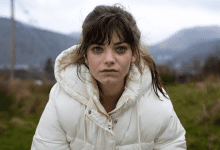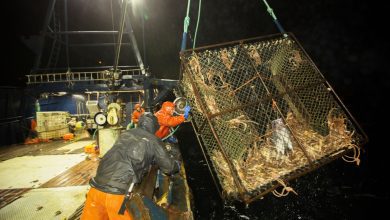‘The Handmaid’s Tale’ Star Amanda Brugel Shares Full Backstory for Rita After Finale
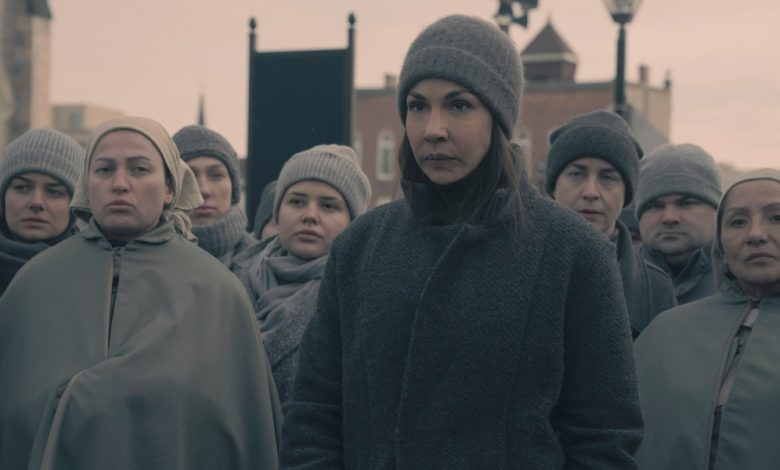
[This story contains spoilers from The Handmaid’s Tale series finale, titled “The Handmaid’s Tale.”]
When speaking to The Hollywood Reporter for the recent oral history on The Handmaid’s Tale, Amanda Brugel spoke about how in 1996 she wrote a thesis on the 1985 novel by Margaret Atwood, but specifically on the character Rita. Twenty years later, she was cast in that role for the Hulu adaptation that recently ended its six-season run. Below is THR‘s full conversation with Brugel, who talks about her Canadian connection with Atwood, how she imagines Rita’s future after the series finale (and possibly in The Testaments sequel series), and she shares for the first time the detailed backstory she created for Rita that is sure to enlighten even the most devoted readers and viewers.
***
I understand that you wrote a college thesis on The Handmaid’s Tale, can you share that story?
I immediately fell in love with the book when I was 14 in a class for Canadian literature. I loved how Margaret wrote female protagonists. I wrote a series of short stories and in grade 10, I won a small scholarship to start applying for universities. When I went to university, I went to theater school and I didn’t know if I wanted to be a writer or actor. To get into the writing program, you had to submit a thesis of what you thought your writing career would be. I chose to write it on The Handmaid’s Tale, but specifically on Rita, and I got a full scholarship to the York University writing program. That was in 1996.
Why did you explore Rita of all the characters?
Because she was the least featured. I’m most interested in the person who is the least featured. They’re able to get away with a lot. I thought she was mysterious. In the book, she’s very mean. And when someone is that mean, my theory is there is more to it. I thought she was mysterious and strong and interesting in a way that wasn’t the same as June or Serena Joy. I loved her from the beginning.
Then how many years passed until the role of Rita came your way?
That was 1996, and in 2016, I got the role. The show’s Canadian casting director Robin Cook knew how much I liked the book. I always had a copy on me. She told me they were turning it into a series and she was casting for it. She said, “I’m going to bring you in for an audition. They’re not going to give it to you. You’re Canadian. It’s going to go to an American. But I’m going to bring you in so you can talk to the creators.”
In the room was Bruce [Miller] and Reed Morano, the director. We just chatted about Rita and my thoughts on the series. A couple weeks later, I got the job. I’m still shocked about it. It’s been a decade almost, but it’s still the most shocking thing that’s ever happened to me.
What scene did you do in your audition?
The tuna and oranges scene, which is famously our introduction to Rita’s sarcasm and her ability to eviscerate someone and be funny about it. At least in the beginning, she was like that a lot. There was also a scene when June goes to a birthing ceremony and you see Rita’s softer side because she’s on pins and needles in anticipation of knowing if the baby was OK. Those are the two sides of Rita: the heart and the wanting to protect children and family, and then the other side that’s like, “I’ll cut you.”
She was not a series regular in season one, right?
Right.
So was it a guest role. Were you cast for a couple episodes?
It was one day with the promise that there could be more days. But I was like, “You’re telling the wrong person this because I know how much she’s in the book.” So I was hopeful they would keep her around. Then after we gelled and after the chemistry in the Waterford house in the first season, once we got picked up for a second season, that’s when she became a series regular. But even in season one, I felt like I was a regular. I was on set more the than on any of the other seasons.
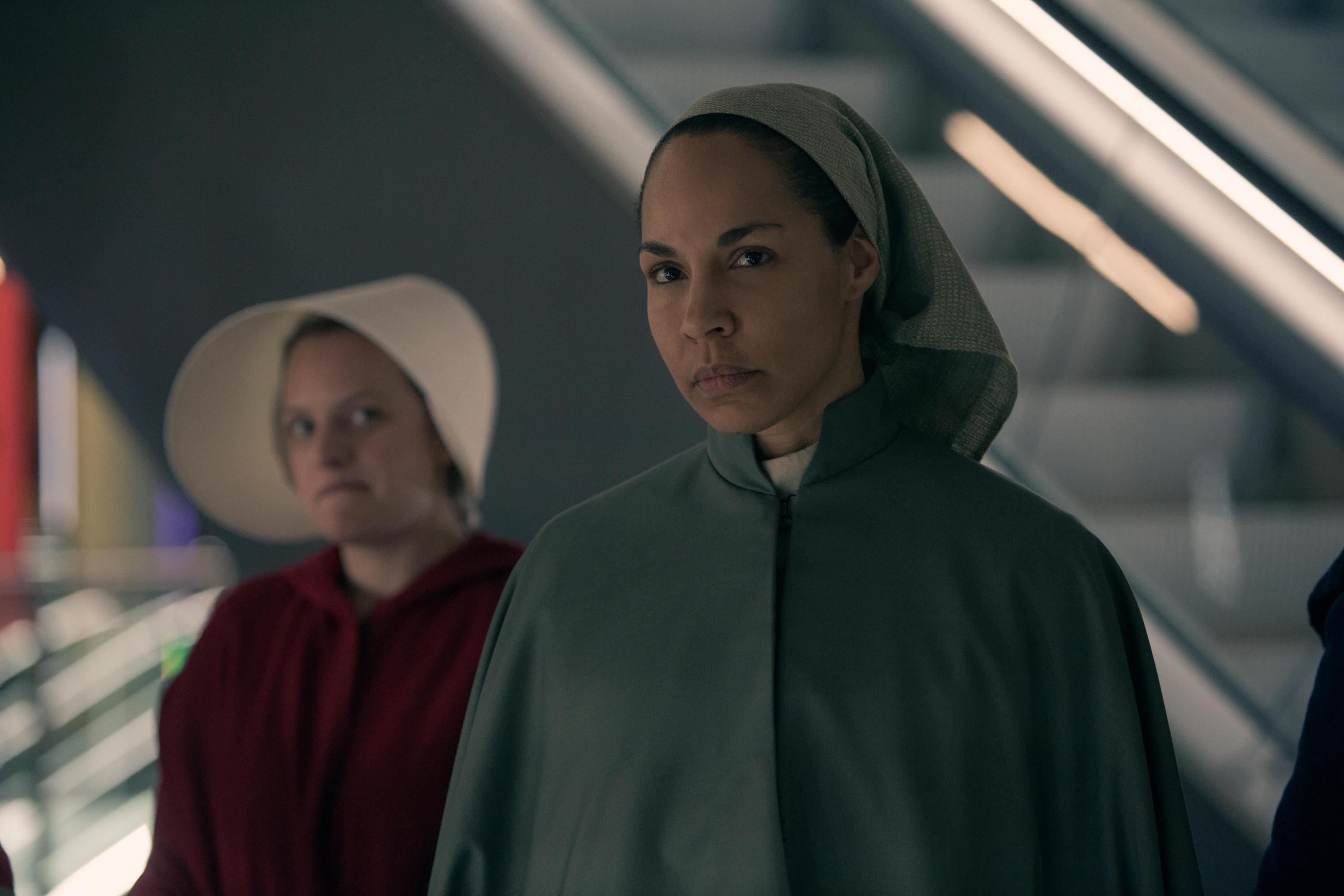
You were in every episode of season one.
Yep. When I signed the series regular contract [for season two], that’s when I knew I would be sticking around. I think it was towards the end of the [first] season, when talking with the other writers and knowing that we were going to be picked up and Rita was part of the conversations. I knew that I was going along for the ride and was just thrilled.
I’m sure you’ve imagined what the Waterford house looked like in your own head so many times. Was it what you had imagined when you stepped onto set?
No. Almost everything was different, aside from Ane Crabtree’s costumes — the colors, that fit, the attention to detail that Ane put into the costumes is a masterpiece in costuming and will go down for years and years. It could have been the [1990] Handmaid’s Tale movie that I watched many times that swayed me at how I thought everyone would look, but everything felt very dark and heavy and there was a lot of wood that I didn’t anticipate from reading the book. I anticipated more opulence. In my head, I always pictured a little more 1980s Dynasty than the dark, heavy, masculine vibes in the Waterford home.
As you continued to make your way around the Waterford home and world of Gilead, was there anything on set that you did find striking?
My very first day on set, I looked around and it was Elisabeth Moss and Joseph Fiennes and Max Minghella and Yvonne Straehovski and me. It’s a pilot — everyone’s nervous. I couldn’t move. I have a picture of it still. It was casual in between setups. Max was sitting on the floor. I was standing there looking up at the lights and I thought, “If I don’t move, they won’t notice me and they’ll let me stay.” I have a picture of Lizzie and Yvonne casually talking on the floor and I’m staring up the ceiling, trying to hide. That was definitely a pinch-me moment.
That’s very Rita by the way, very in character.
Very. Season three when I flee with the children [and save the plane of Gilead children], we walked through the forest with I think 250 background performers — all women and children in the quiet forest of Ontario. It was beautiful and balmy outside. I will never forget it. I actually pull on that moment now for other roles when I want to feel powerful or scared.
You are also the only Canadian actor on the main cast.
I’m the only Canadian.
Do you think that’s why you and Margaret Atwood formed such a bond?
(Laughs) I think so. When I was growing up, if anyone said, “Who would you want to meet or have dinner with?” My answer was Margaret since I was 14. I think it’s the Canadian connection. Early on at a lot of the award ceremonies [for The Handmaid’s Tale], they would have me sit with or accompany Margaret. She’s intimidating and honest and extraordinarily smart. She doesn’t suffer fools. She’s not interested in benign, boring conversation. After I learned that very quickly, I’ve just developed a rapport with her. I’m not scared of her, which I think is helpful. She picks up on that.
When dd you first meet her?
There was a book reading where she was reading an excerpt of Handmaid’s Tale and I came as a guest, and then spoke to her briefly afterwards. It was such a casual conversation. I think I spoke to her about my personal life. From then on, she’s been a protector of mine. In the back of The Testaments is a beautiful dedication to me and some of the cast members. She’s really advocated for me and has been a champion of mine. It’s the biggest honor of my life.
Did you know she was going to include you in the cast dedication in The Testaments?
No. I found out from my fiancee’s brother-in-law and I started crying. I had to go to the bathroom to pull myself together! I have two copies of The Testaments, but I have the page ripped out with that dedication framed in my washroom.
Rita ends up much more developed than what you could have gleamed from the book. Do you feel like Margaret was pushing for you throughout the series?
I don’t know. I know that Margaret gave Bruce a short list of those who weren’t allowed to die. I know that I wasn’t on the chopping block. But I don’t particularly think it was Margaret advocating for me. I know the writers were and Bruce. I think at a certain point, I was lucky enough to have some interest by the viewers, so that helped keep me off the chopping block.
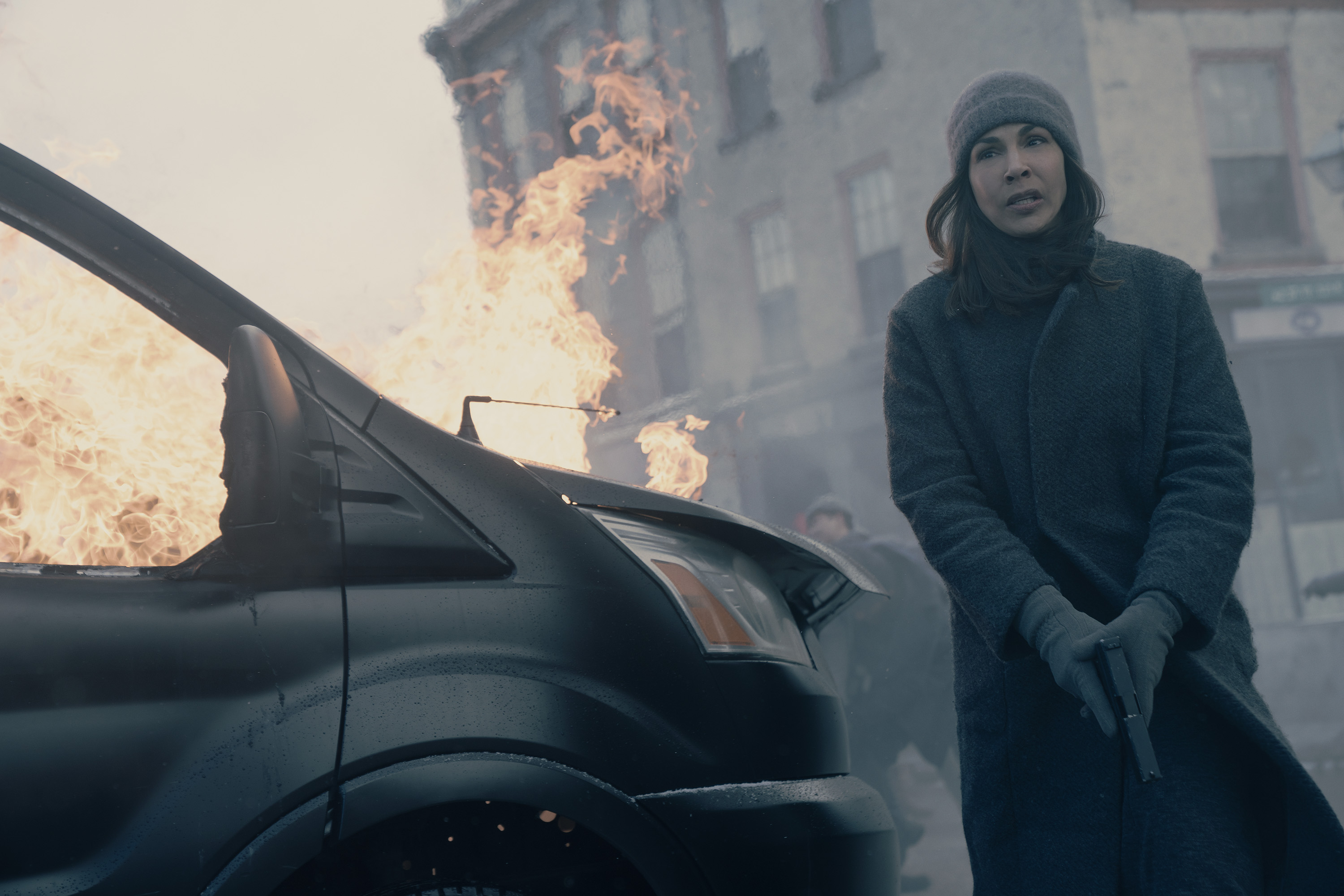
With a show like The Handmaid’s Tale where anyone could die at any moment, would you have conversations at the beginning of each season with the writers to get your arc, or were you finding out as you would get the scripts?
I wasn’t [having those conversations]. I know other cast members had that privilege, and it really is a privilege to be able to do that. But I found out as everyone did. I remember scripts came in late one year and I believe it was the year that I fled to Canada, and I didn’t know. I had no idea what was going to happen in that final episode. I was on a family vacation and the script came and they came in late, so I was going to shoot two days later. I’m sitting and scrolling, just trying to look at what was going to happen and realizing I was going to leave Gilead. I was going to Canada. I found it all out almost in real time as the crew did. I’ve had to rebound and reflex really quickly to find out how I’m going to play.
Is that a fun challenge or just a challenge for you?
It’s not fun! But I am so thankful for it because over the years it gave me a sense of how to quickly respond, and then create such a richer backstory for myself because it wasn’t provided for me. That really has impacted how I move forward. I’m eternally grateful for it.
Do you know if they ever thought about doing a Rita backstory episode?
No, I don’t know. But in conversations for this final season, there was going to be a significant peek into her life with her family. And I don’t know what happened to that. The co-showrunners Yahlin [Chang] and Eric [Tuchman] have been such champions of Rita from the beginning. So there’s a reason why at the end you see her have some pretty heroic moments — in Rita fashion, still quiet, but still quite heroic. I think that was their attempt at giving Rita her time to shine.
We know she had a son who died.
Nicholas, yes.
Since we never got that backstory, can you fill in for us now what you created for her that we didn’t get to see?
In my imagination, Nicholas wasn’t fighting for Mayday. Nicholas was pro-Gilead — pro the movement. [Speaking as Rita] He was my only son. I wasn’t married. I was an executive in a boardroom and he, not unlike a lot of young men, became radicalized and wanted to fight for a society that changes the way women are able to move through the society. So we had horrible words the last time we spoke and he went off to fight for Gilead and he died.
I think Rita has always felt a certain amount of guilt, and that’s why throughout the seasons you see her so strong and sarcastic at the beginning, but then more beaten down by Gilead and she becomes more of a turtle in a shell, because that death has weighed on her. That’s at least how I was able to evolve the performance. I wanted her to slowly be broken down and then towards the end, find herself; the person who we meet at the beginning.
I read that in your thesis, you thought Rita was a handmaid before she was a Martha?
Yes. In the book, Rita is much older. But in my thesis, I offered up an idea that she originally was a handmaid. That it was horrific, and that she was able to either bribe or do an exchange with one of the Eyes to help her switch. In the book, you’re tested to see how fertile you are. So they were able to test and she was deemed infertile. So therefore, you become a Martha and that was her way of being safe. Being a handmaid, there are certain freedoms, but you don’t have the monthly rape as a Martha. You have a home, you have a purpose, you’re around children. And if you keep your head down and mouth shut, it’s an OK gig. I feel like she was savvy in that way and she tried to get herself to a place where she was unbothered for the most part.
Have you ever shared that backstory with Margaret Atwood or Bruce Miller?
No. Also, how did you know that?
I read a past interview of yours.
I’ve never talked about it to the extent that I just did, so no one knows all of that.
It makes sense because she’s resourceful. She’s a survivor. When she smuggled those children out, that was her hero moment. Did that feel like a gift to you when you saw that in the script?
She’s sort of the silent hero. It takes a lot for an actor who is always there to support performances, but also the character herself, who’s just quietly sneaking June out or quietly getting the letters from Mayday and giving them to people. There’s always these little moments where she quietly saves the day that because it was so bold in which that she got to land with these children and have the big moment in the airport, I didn’t anticipate that it was definitely going to be written.
And then having the ability to shoot it. That was also my first time on set with Samira [Wiley] and O-T [Fagbenle]. I’d never really spoken to them on set. This was season three. At awards shows, we would celebrate together. But we didn’t have a relationship. So that all sort of convalesced into this gorgeous moment of having that time to celebrate Rita, and then also meeting my closest friends on the show. It was a beautiful day.
Then it all culminates into her becoming this resistance hero in the end — Rita and Luke saved the day with Mayday in the penultimate episode. Knowing Rita’s story could have gone so many ways, how did you feel about her ending?
So thankful. I love her so much. And because the audience doesn’t know much about her and I’ve filled in her blanks, I felt vindicated. I felt that she was finally going to be seen and have the well-deserved moments of triumph that this character deserves. My ego got invested for her because I love her so much. But I also loved it for audience members.
Yahlin and Eric always said they think of Rita as the person who’s closest to the audience, not necessarily a person who’s going to arm themselves but someone who wants to keep themselves safe; keep their families safe and not make wild crazy choices. Keep your head under the radar, just the normal average person. And while I can get down with that and I love that, she’s got so much more rebellion in her. So finally to be able to see her actively rebel and for so many episodes, not just one moment, it’s the best end to me for her.
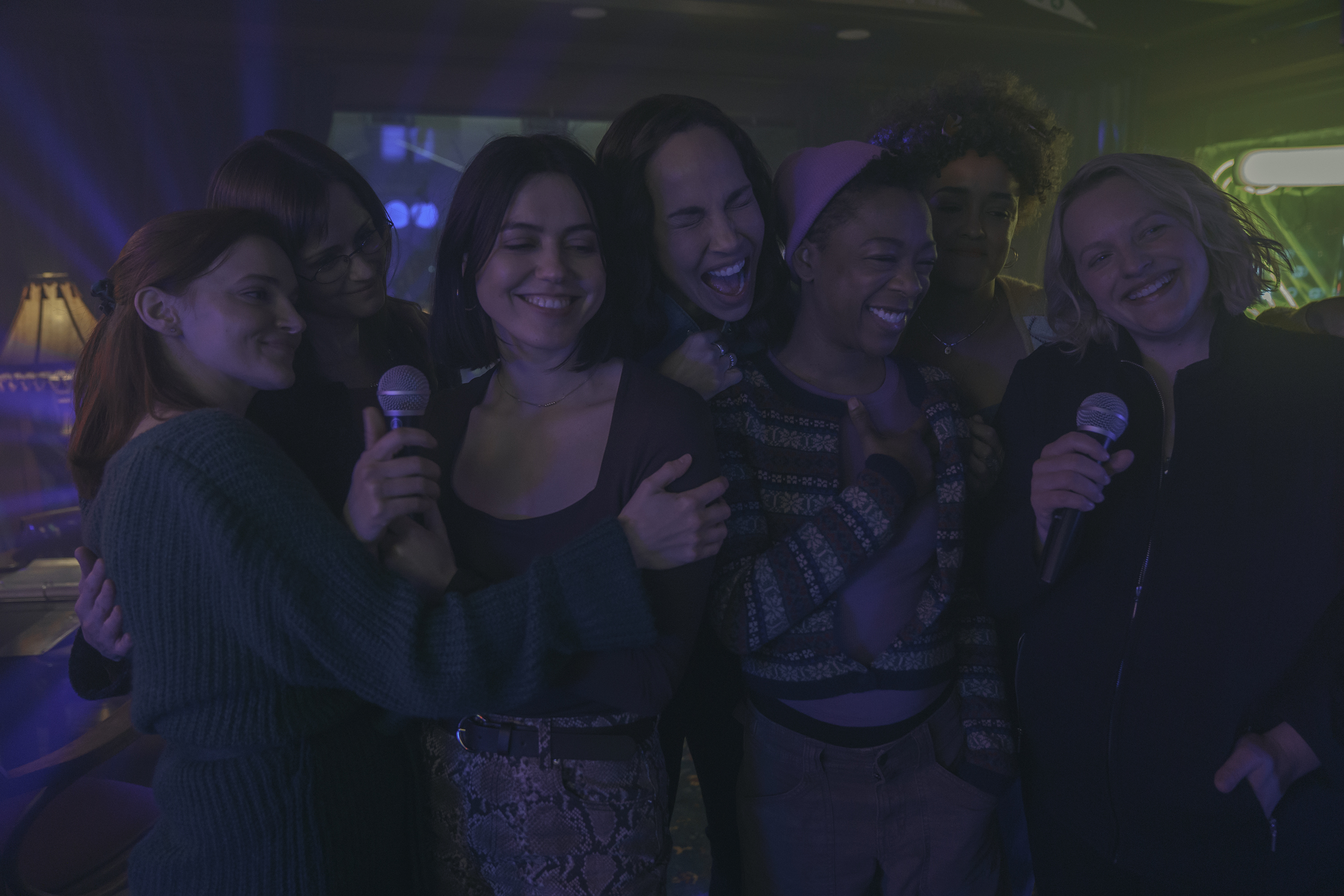
The last we hear June say is that Rita and Moira (Samira Wiley) are getting drunk and celebrating Gilead falling in Boston. But we know there’s still a long road ahead. When you think about her and where she is in the universe, do you think she continues to fight? Do you think she goes and makes a life for herself? How do you imagine her from where the show ends?
I imagine she gets out of New Bethlehem, out of Gilead, and goes and takes her family and lives a quiet life. However, my final backstory for her was that she was going to continue to fight in the Rita way, where she would become either a spy or an intelligence mover of information quietly, as she has done in the whole series. She will do that until the day she dies. She has a nephew — you guys were supposed to know this — and my imagination is that at the end when she dies, her nephew when packing up all of her stuff finds all of this evidence that Rita was able to take out different cells of Gilead and was part of the information transfer in taking out lots of people in Gilead. But no one really knows it until she dies. That’s the end story that I have for her. The writers and creators don’t know of it, but I do. And that’s what matters to me.
Rita is not mentioned in The Testaments, right?
No. She’s not. But that doesn’t mean you might not see her.
Have you had any conversations about that that you’re able to share?
Not that I’m able to share.
If the opportunity came for Rita to be part of the underground fight in the sequel, would you be interested in doing that?
I would. I love the team. I love all of them. I would never say no. I do think that the story would have to be there, enough meat and substance that she deserves. But Bruce and Lizzie and Warren [Littlefield are producing The Testaments] in Canada — they’re still at the [production] stages in my hometown. She’s always going to be with me. And so my answer is yes, I would love to.
Did you take anything from set?
I took stuff all the time. Not just in the last season. When the Waterford house burnt down, because women can’t read, there were little salt and pepper shakers that just had the salt and pepper on them. I took those. I took my New Bethlehem visitor card and my Gilead identification. My Martha costume. A costume that [costume designer] Leslie Kavanagh built for us for the wedding. Shoes. I took things!
Was the reception different in Canada for you?
You know what’s shocking to me? So many more of my American friends know so much more about the book than Canadians my age. I get disappointed because I’m like, “Where are y’all? What did you do in high school?” I’m stopped here 100 times more than I am in Canada. People cry and want to tell me about their very personal things and I love it so much.
You want to do a job and for the job to be received well. As an actor you just want to work. But then when you know it affects so many people on an emotional, cultural, political level, it’s lucky to have those conversations with strangers. It’s why we tell stories.
In the finale, you and a group of living and dead handmaids have this dream sequence where you are all dancing. It’s nice to see Rita there because she’s the only non-handmaid. What was it like to all film together, and to welcome back Alexis Bledel (Emily) and Nina Kiri (Alma) and Bahia Watson (Brianna) for that scene?
Wonderful. I have so many photos from that day. Nina and Bahia are very good friends of mine. They’re the only other two Canadians. To be reunited again on set was a dream. It was a dream sequence, but the day was a dream. It was also the day I wrapped. I got to give a speech to the crew and to thank my Canadian crew. And then my girls were there. Madeline [Brewer], Nina, Bia — they will be with me for life. It was a beautiful day. No one is acting in that dream sequence when we’re all singing. We’ve all done it so many times together out of character. It was so lovely to be with Alexis. I miss her so much.
What was it like over the years to say goodbye to departed cast?
It was incredibly difficult saying goodbye, particularly to the cast members who had been there since day one. I was devastated when Nina and Bahia departed. When they left, it felt as if many of our shared memories and inside jokes went with them. I also felt the absence of Joe [Fiennes, whose Commander Waterford died at the end of season four]. He is the epitome of a true gentleman and I loved our discussions. I still think of him all the time. When Alexis left, it was shocking and sad. Alexis is one of my favorite actors to work with on and off set, so when we were all reunited in the finale, it was, by far my favorite day that I’ve had on the series. I could hear Maddie, Nina and Bahia giggling and singing in the trailer beside me before heading to set. Samira and I spent hours catching up with Alexis in the back of a van. It was such a joyful, easy, reunion like no time had passed. There is a genuine history between all of us, so having the rare chance to relive a bit of that history was an enormous gift.
***
The Handmaid’s Tale is streaming all episodes on Hulu. Read THR’s comprehensive oral history on the series, mini oral history on the penultimate episode and series finale explainers on June’s ending, Serena’s ending, Janine’s ending and Luke’s ending.
Source: Hollywoodreporter
HiCelebNews online magazine publishes interesting content every day in the TV section of the entertainment category. Follow us to read the latest news.
Related Posts
- Kathy Bates Claims Garry Marshall Rejected Her for Role Because Her Kissing a Man “Would Not Be Romantic”
- Ariana Grande, Pedro Pascal, Sabrina Carpenter Sign Open Letter Supporting Federal Funding for LGBTQ Youth Suicide Prevention
- Sky Content Chief Says “We Had an Amazing Bubble” in Production
- Former Escort Hired for Diddy’s Alleged 'Freak Offs' Breaks His Silence to Share Emotional Message for Cassie (Exclusive)
- ‘Lost in Starlight’ Director Han Ji-won on Blending Romance and Sci-Fi for Netflix’s Breakthrough Korean Animated Feature

